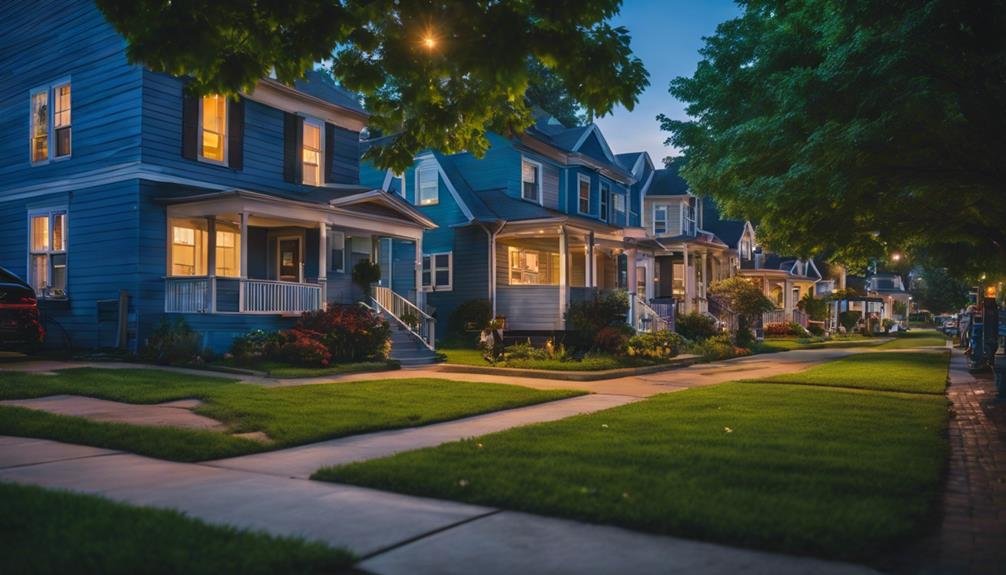HUD stands for the U.S. Department of Housing and Urban Development. Established in 1965, this federal agency oversees national housing policies and community development initiatives. Its mission is to advance sustainable, inclusive communities while providing affordable housing options. HUD administers essential programs like the Federal Housing Administration for mortgage assistance and the Housing Choice Voucher Program for low-income families. Additionally, HUD enforces fair housing laws to guarantee equal access to housing opportunities. Understanding HUD's extensive role can provide deeper knowledge into the various services and protections available in the real estate industry.
Main Points
- HUD stands for the U.S. Department of Housing and Urban Development, overseeing national housing policies and community development since 1965.
- It administers programs like the Federal Housing Administration (FHA), providing mortgage financing and support for homebuyers.
- HUD enforces the Fair Housing Act, promoting equal access to housing and preventing discrimination.
- The department offers resources and programs for renters, including the Housing Choice Voucher Program to assist low-income families.
Overview of HUD
The U.S. Department of Housing and Urban Development (HUD) plays an essential role in overseeing national policies and programs that address housing needs and support community development. Established in 1965, HUD aims to create strong, sustainable, inclusive communities and quality affordable homes for all. This mission is executed through various initiatives that advance fair housing, economic growth, and access to affordable housing.
HUD is responsible for the administration of numerous federal programs, including the Federal Housing Administration (FHA), which insures loans for homebuyers and enables access to mortgage financing. Additionally, the agency oversees the Housing Choice Voucher Program, which assists low-income families in securing safe and affordable rental housing. By providing financial assistance and enforcing fair housing laws, HUD works to eliminate discrimination and advance equal housing opportunities.
Moreover, HUD collaborates with state and local governments, non-profit organizations, and private sector stakeholders to encourage community development. It provides funding through grants and technical assistance for various projects, including public housing, urban renewal, and infrastructure improvements. The agency's commitment to environmental sustainability and community resilience is also evident in its support for green building practices and disaster recovery efforts.
History of HUD

The History of the U.S. Department of Housing and Urban Development (HUD) is marked by its formation in 1965, reflecting a growing recognition of the need for a coordinated approach to housing and urban development.
Key legislative milestones, such as the Fair Housing Act of 1968, have shaped its mission and objectives over the years.
Understanding these historical developments provides insight into HUD's role in addressing housing challenges in America.
Formation of HUD
Established in 1965, the Department of Housing and Urban Development (HUD) emerged as a response to the growing need for thorough housing policies and urban development initiatives in the United States. The formation of HUD marked a notable shift in federal housing strategy, addressing both the quality of housing and the issues of urban poverty and segregation.
The creation of this cabinet-level agency consolidated various programs and functions previously managed by different governmental entities, allowing for a more coordinated approach to housing and urban development. The initiative was propelled by the increasing recognition of the importance of adequate housing in promoting economic stability and community growth.
HUD was charged with promoting fair housing practices, improving living conditions, and facilitating access to affordable housing for all citizens. The agency's establishment came during a period of social change and civil rights movements, highlighting the need for equitable housing policies.
In its early years, HUD focused on the implementation of urban renewal projects, the construction of public housing, and the enforcement of fair housing laws, setting the foundation for its ongoing mission to improve housing opportunities and urban development across the nation.
Key Legislative Milestones
Throughout its history, HUD has been shaped by key legislative milestones that have defined its role in advancing fair housing and urban development across the United States.
The Housing Act of 1949 marked an important starting point, establishing the goal of providing decent housing for all Americans and laying the groundwork for the creation of public housing programs.
In 1965, the establishment of HUD itself highlighted the federal commitment to improving urban living conditions.
The Fair Housing Act of 1968 was another critical milestone, prohibiting discrimination in housing based on race, color, religion, sex, or national origin, thereby championing civil rights in housing.
Subsequent legislation, such as the Housing and Community Development Act of 1974, introduced block grants to assist local communities in addressing their housing needs.
The Cranston-Gonzalez National Affordable Housing Act of 1990 further emphasized the need for affordable housing options.
These milestones collectively underscore HUD's evolving mission to cultivate sustainable communities, support economic opportunity, and guarantee equitable access to housing, reflecting the changing social and economic environments of America.
Key Functions of HUD
Among its key functions, HUD plays a vital role in promoting affordable housing and guaranteeing equal access to housing opportunities for all individuals. The department is instrumental in implementing policies aimed at reducing homelessness, supporting community development, and improving the quality of housing across the United States.
HUD operates through various initiatives that focus on fair housing, financial assistance, and regulatory standards. One of its notable functions is to enforce the Fair Housing Act, which prohibits discrimination in housing based on race, color, religion, sex, national origin, familial status, or disability. This enforcement guarantees that all citizens have the right to secure housing without facing prejudice.
Another essential function of HUD is the provision of funding and support for public housing authorities and community development projects. This support encourages sustainable development and revitalization in urban areas, ultimately benefiting low-income families and individuals.
The table below summarizes some of the key functions of HUD:
| Function | Description |
|---|---|
| Affordable Housing Promotion | Initiatives to increase the availability of affordable homes. |
| Fair Housing Enforcement | Monitoring and enforcing compliance with housing discrimination laws. |
| Community Development Support | Providing funding for community improvement projects. |
| Homelessness Prevention | Programs aimed at reducing and preventing homelessness. |
Through these functions, HUD greatly impacts the housing environment, working to create a more equitable and accessible setting for all Americans.
HUD Programs for Homebuyers

HUD offers a variety of programs designed to assist homebuyers in achieving their goal of homeownership, furthering its mission to advance affordable housing and equitable access to housing opportunities. These programs cater to diverse needs, providing financial assistance and resources to help individuals and families maneuver the homebuying process.
Some key HUD programs for homebuyers include:
- FHA Loans: Insured by the Federal Housing Administration, these loans offer lower down payment options, making them accessible to first-time buyers.
- Good Neighbor Next Door Program: This initiative provides notable discounts on homes for teachers, law enforcement officers, firefighters, and EMTs, promoting community revitalization.
- HOME Investment Partnerships Program: This program provides funding to local governments and non-profits to create affordable housing opportunities for low-income families, which may include resources for homebuyers.
HUD's Role in Fair Housing

Guaranteeing equitable access to housing opportunities is a fundamental aspect of the U.S. Department of Housing and Urban Development's commitment to promoting fair housing practices.
HUD plays a crucial role in enforcing the Fair Housing Act, which prohibits discrimination in housing based on race, color, national origin, religion, sex, familial status, or disability. This legislation aims to eliminate barriers that have historically marginalized certain groups and guarantees that all individuals have the right to secure housing without facing prejudice.
HUD's efforts include investigating complaints of housing discrimination, conducting educational outreach to raise awareness of fair housing rights, and providing resources to assist victims of discrimination. The agency works in collaboration with local jurisdictions and community organizations to develop extensive strategies for promoting fair housing.
Through grants and funding, HUD supports initiatives aimed at increasing access to affordable housing and encouraging inclusive communities.
Moreover, HUD's research and data collection efforts contribute to understanding housing disparities and inform policy decisions. The agency also monitors compliance with fair housing laws and provides technical assistance to housing providers, guaranteeing they understand their responsibilities under the law.
Impact of HUD on Renters

The impact of HUD on renters is considerable, as the agency implements policies and programs designed to improve housing stability and affordability for low- and moderate-income individuals. Through various initiatives, HUD plays an essential role in shaping the rental environment, ensuring that vulnerable populations have access to safe and decent housing.
Key aspects of HUD's influence on renters include:
- Housing Choice Voucher Program: This program allows low-income families to rent homes in the private market, greatly increasing their housing options.
- Affirmatively Furthering Fair Housing: HUD's commitment to fair housing practices helps combat discrimination, promoting equal access to housing for all individuals regardless of race, color, or national origin.
- Rental Assistance Programs: These programs provide financial support to families in need, helping them to afford rent and reduce homelessness, thereby encouraging community stability.
How to Access HUD Resources

Accessing HUD resources is often straightforward for those who meet eligibility requirements, as the agency provides a variety of programs and services aimed at assisting individuals and families in need of housing support. To begin, potential beneficiaries should visit the official HUD website, which offers thorough information on available programs, eligibility criteria, and application processes.
One of the most notable resources is the local Public Housing Authority (PHA), which administers HUD programs at the community level. Individuals can locate their nearest PHA through the HUD website and inquire about available housing options, including rental assistance programs like the Housing Choice Voucher Program.
For those seeking homeownership assistance, HUD offers various programs such as the Federal Housing Administration (FHA) loans, which can make home buying more accessible. Applicants can find approved lenders through the HUD website to begin the mortgage application process.
Additionally, HUD provides numerous educational resources, including workshops and webinars on topics such as budgeting, credit repair, and home maintenance. These resources can be essential for individuals looking to improve their financial literacy and traverse the housing market more effectively.
Future of HUD in Real Estate

As housing challenges continue to evolve, HUD's role in shaping real estate policy and providing vital support services will be essential in addressing the needs of diverse communities across the nation.
The environment of housing in the United States is marked by increasing demand, rising prices, and a growing need for affordable options. Consequently, HUD's future initiatives will likely focus on nurturing sustainable development, improving accessibility, and promoting equitable housing opportunities.
Key areas where HUD is expected to make notable strides include:
- Affordable Housing Development: Expanding programs that incentivize private developers to create affordable units.
- Modernization of Policies: Updating regulations to better align with current market dynamics and technology advancements.
- Community Partnerships: Strengthening collaborations with local governments and non-profit organizations to improve service delivery.
HUD's commitment to innovation and flexibility will be vital in addressing widespread issues within the housing sector.
By leveraging data-driven strategies and stakeholder engagement, HUD can better meet the challenges posed by economic fluctuations and demographic shifts.
As we look ahead, the agency's ability to provide effective solutions will play a key role in shaping a housing market that is inclusive, resilient, and responsive to the needs of all Americans.
Common Questions
How Does HUD Affect Property Values in Neighborhoods?
HUD influences property values through its policies and programs aimed at improving neighborhood stability, promoting affordable housing, and facilitating community development. These initiatives can lead to increased demand and improved economic conditions in affected areas.
Can HUD Assist With Foreclosure Prevention?
HUD can assist with foreclosure prevention through various programs, including counseling services, financial assistance, and educational resources. These initiatives aim to help homeowners steer through financial difficulties and maintain their housing stability during challenging economic times.
What Are Hud's Requirements for Rental Properties?
HUD requires rental properties to meet specific standards, including safety, sanitation, and structural integrity. Additionally, properties must comply with local building codes, have appropriate amenities, and provide equal access to housing for all individuals.
Are There HUD Grants for Home Repairs?
Yes, HUD offers various grant programs for home repairs, such as the Community Development Block Grant (CDBG) and the HOME Investment Partnerships Program, aimed at assisting low-income households in improving their housing conditions and safety.
How to Report Housing Discrimination to Hud?
To report housing discrimination to HUD, visit their website or call their office. Complete a complaint form detailing your experience, including names, dates, and locations. Make certain you submit your complaint within one year of the incident.
Conclusion
In conclusion, the U.S. Department of Housing and Urban Development (HUD) plays an essential role in the real estate sector by promoting fair housing, facilitating homeownership, and providing important resources for renters.
Its various programs and initiatives have greatly impacted housing accessibility and affordability across the nation.
As challenges in the housing market evolve, HUD's continued commitment to addressing these issues will be crucial for nurturing sustainable communities and ensuring equitable access to housing for all citizens.

Leave a Reply